 Two thirds of all the growth in global advertising expenditure between 2017 and 2020 will come from paid search and social media ads, according to Zenith’s Advertising Expenditure Forecasts, published on September 24. Over this period, total spending will increase from US$86bn to US$109bn on paid search, and from US$48bn to US$76bn on social media. Paid search will grow by US$22bn over this period, while social media will grow by US$28bn, making it the single biggest contributor to growth.
Two thirds of all the growth in global advertising expenditure between 2017 and 2020 will come from paid search and social media ads, according to Zenith’s Advertising Expenditure Forecasts, published on September 24. Over this period, total spending will increase from US$86bn to US$109bn on paid search, and from US$48bn to US$76bn on social media. Paid search will grow by US$22bn over this period, while social media will grow by US$28bn, making it the single biggest contributor to growth.
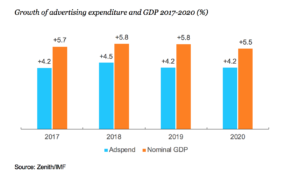 Paid search has undergone constant development in recent years. Search platforms, agencies and brands are applying ever more sophisticated artificial intelligence techniques to improve targeting, messaging and conversion. Search is becoming more integrated with commerce, both online – as brands shift budgets to e-commerce platforms – and offline, as retailers use location and store inventory data to match active shoppers directly with the products they’re searching for. All these developments are attracting higher performance budgets from brands, often new expenditure rather than being diverted from brand awareness activity. Overall Zenth expect them to drive an average of 8% annual growth in paid search adspend between 2017 and 2020.
Paid search has undergone constant development in recent years. Search platforms, agencies and brands are applying ever more sophisticated artificial intelligence techniques to improve targeting, messaging and conversion. Search is becoming more integrated with commerce, both online – as brands shift budgets to e-commerce platforms – and offline, as retailers use location and store inventory data to match active shoppers directly with the products they’re searching for. All these developments are attracting higher performance budgets from brands, often new expenditure rather than being diverted from brand awareness activity. Overall Zenth expect them to drive an average of 8% annual growth in paid search adspend between 2017 and 2020.
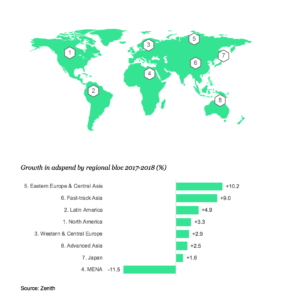 The next step in the evolution of search is voice search, but so far there has been little direct advertising through voice assistants. When users make a voice search on a smart speaker, they will normally only be presented with the first organic result; voice searches on smartphones may present more results, but not as many as manual searches. The rise of voice search therefore makes it more important for brands to identify the keywords they absolutely need to own, and to build content that sends them to the top of organic results. Zenith expect the search platforms will eventually make paid search work with voice assistants, but for now brands need to concentrate on voice SEO, limiting the growth potential of paid search in the short term.
The next step in the evolution of search is voice search, but so far there has been little direct advertising through voice assistants. When users make a voice search on a smart speaker, they will normally only be presented with the first organic result; voice searches on smartphones may present more results, but not as many as manual searches. The rise of voice search therefore makes it more important for brands to identify the keywords they absolutely need to own, and to build content that sends them to the top of organic results. Zenith expect the search platforms will eventually make paid search work with voice assistants, but for now brands need to concentrate on voice SEO, limiting the growth potential of paid search in the short term.
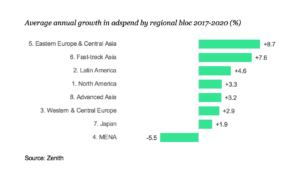 Much of the recent rapid growth in social media advertising has come as platforms have replaced static ads with more engaging video ads. So far these social video ads have acted more as complements to television ads than competitors, but the platforms are now competing with television more directly by hosting long-form content like sport, drama and comedy, and inserting mid-roll ads like those seen in television breaks. Overall Zenith expect social media adspend to grow by an average of 16% a year to 2020, twice the rate of paid search.
Much of the recent rapid growth in social media advertising has come as platforms have replaced static ads with more engaging video ads. So far these social video ads have acted more as complements to television ads than competitors, but the platforms are now competing with television more directly by hosting long-form content like sport, drama and comedy, and inserting mid-roll ads like those seen in television breaks. Overall Zenith expect social media adspend to grow by an average of 16% a year to 2020, twice the rate of paid search.
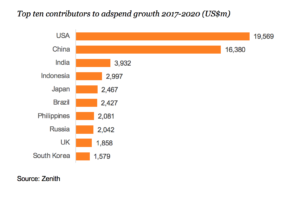 The fastest-growing traditional medium is cinema, which the agency forecast to grow by 16% a year thanks to rapidly rising admissions in China. It is a tiny medium, though, representing just 0.8% of total adspend this year. Otherwise outdoor is the strongest performer, with 3% annual growth. Outdoor is benefiting from its wide reach and ability to create mass awareness, which allows it to complement highly targeted online advertising for premium brands. While targeted online ads move buyers along the path to purchase, premium brands still need to create widespread awareness among non-buyers – a premium brand will only remain one if everyone recognises its premium value.
The fastest-growing traditional medium is cinema, which the agency forecast to grow by 16% a year thanks to rapidly rising admissions in China. It is a tiny medium, though, representing just 0.8% of total adspend this year. Otherwise outdoor is the strongest performer, with 3% annual growth. Outdoor is benefiting from its wide reach and ability to create mass awareness, which allows it to complement highly targeted online advertising for premium brands. While targeted online ads move buyers along the path to purchase, premium brands still need to create widespread awareness among non-buyers – a premium brand will only remain one if everyone recognises its premium value.
Global adspend forecast remains stable
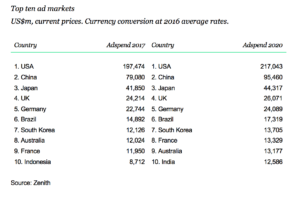 Zenith have held their forecast for global adspend growth this year at 4.5%. Some markets have strengthened since they published their previous forecast in June (notably Canada and the UK), but these have been counterbalanced by markets that have weakened, particularly the Middle East and North Africa (MENA). The agency’s forecast for 2019 is also unchanged at 4.2% growth, while they have reduced their forecast for 2020 from 4.3% growth to 4.2%. Growth will therefore remain within the 4%-5% range it has maintained since 2011.
Zenith have held their forecast for global adspend growth this year at 4.5%. Some markets have strengthened since they published their previous forecast in June (notably Canada and the UK), but these have been counterbalanced by markets that have weakened, particularly the Middle East and North Africa (MENA). The agency’s forecast for 2019 is also unchanged at 4.2% growth, while they have reduced their forecast for 2020 from 4.3% growth to 4.2%. Growth will therefore remain within the 4%-5% range it has maintained since 2011.
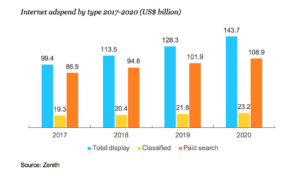 Economic growth has picked up this year in Canada and the UK, and demand from advertisers has been stronger than expected, so Zenith have revised their forecast for adspend growth in Canada this year from 3.8% to 5.6%, and in the UK from 0.7% to 2.4%. These two revisions alone will add US$581m to the global ad market this year. They have also made substantial upward revisions in Vietnam (US$131m), France (US$121m), and Taiwan (US$104m). Western Europe is the most improved region, revised up from 2.3% growth in 2018 to 2.6% growth.
Economic growth has picked up this year in Canada and the UK, and demand from advertisers has been stronger than expected, so Zenith have revised their forecast for adspend growth in Canada this year from 3.8% to 5.6%, and in the UK from 0.7% to 2.4%. These two revisions alone will add US$581m to the global ad market this year. They have also made substantial upward revisions in Vietnam (US$131m), France (US$121m), and Taiwan (US$104m). Western Europe is the most improved region, revised up from 2.3% growth in 2018 to 2.6% growth.
MENA adspend total revised up, but downturn has been worse than Zenith thought
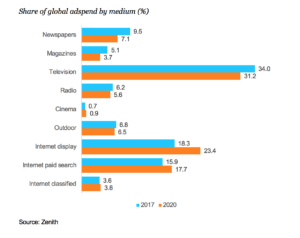 After conducting new research into true levels of expenditure in MENA, Zenith have thoroughly revised their estimates of historic ad expenditure in the region. They have also added figures for Iraq, Jordan and Syria, as well as channels targeting Asian-language speakers across the region. The net effect of these changes is that their estimate of regional adspend is now higher than it was previously, but so too is their estimate of the shock the region has suffered from the drop in oil prices since 2014, political turmoil and conflict.
After conducting new research into true levels of expenditure in MENA, Zenith have thoroughly revised their estimates of historic ad expenditure in the region. They have also added figures for Iraq, Jordan and Syria, as well as channels targeting Asian-language speakers across the region. The net effect of these changes is that their estimate of regional adspend is now higher than it was previously, but so too is their estimate of the shock the region has suffered from the drop in oil prices since 2014, political turmoil and conflict.
The agency now consider that adspend shrank by 40% between 2014 and 2017, more than their previous estimate of 33%. But they estimate that ad expenditure across MENA totalled US$3.6bn in 2017, ahead of their previous figure of US$2.4bn. They now forecast an average annual decline of 5.5% to 2020, well below their previous forecast of 1.4% average annual decline.
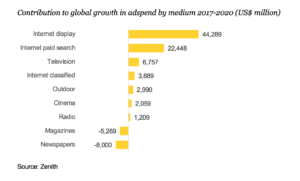 “Better use of AI and integration with retail is driving continued strong growth in paid search,” said Jonathan Barnard, Zenith’s Head of Forecasting and Director of Global Intelligence. “As voice search becomes more important, though, brands will need to focus more on content and SEO to secure first-place organic results for their most important keywords.”
“Better use of AI and integration with retail is driving continued strong growth in paid search,” said Jonathan Barnard, Zenith’s Head of Forecasting and Director of Global Intelligence. “As voice search becomes more important, though, brands will need to focus more on content and SEO to secure first-place organic results for their most important keywords.”
“Voice search is just one way in which AI is transforming the way consumers search for information and entertainment, and the way brands communicate with consumers,” said Vittorio Bonori, Zenith’s Global Brand President. “By linking media investment with commerce, and broad awareness with personalisation at scale, technology is giving brands new tools to create growth.”
Source: Zenith

You must be logged in to post a comment Login